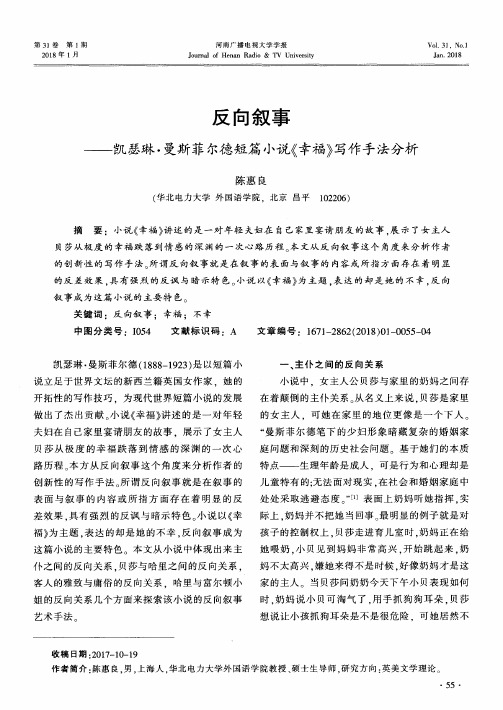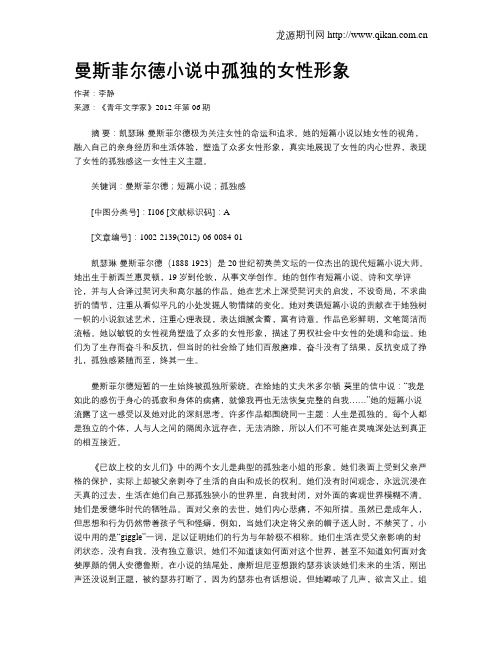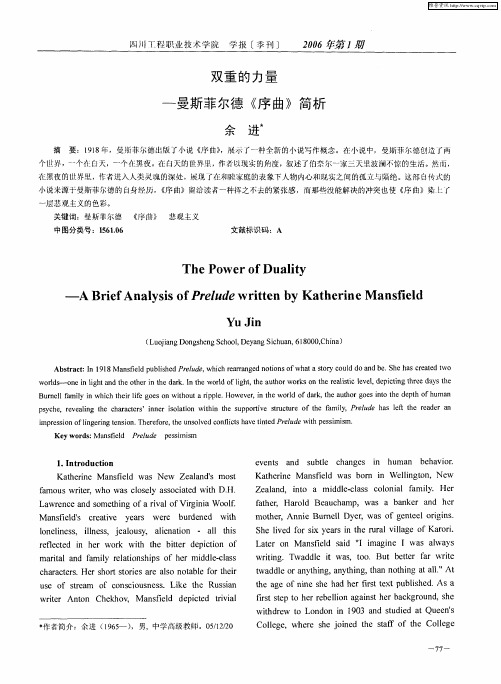REVELATIONS曼斯菲尔德
- 格式:doc
- 大小:39.00 KB
- 文档页数:5


曼斯菲尔德小说中孤独的女性形象作者:李静来源:《青年文学家》2012年第06期摘要:凯瑟琳·曼斯菲尔德极为关注女性的命运和追求。
她的短篇小说以她女性的视角,融入自己的亲身经历和生活体验,塑造了众多女性形象,真实地展现了女性的内心世界,表现了女性的孤独感这一女性主义主题。
关键词:曼斯菲尔德;短篇小说;孤独感[中图分类号]:I106 [文献标识码]:A[文章编号]:1002-2139(2012)-06-0084-01凯瑟琳·曼斯菲尔德(1888-1923)是20世纪初英美文坛的一位杰出的现代短篇小说大师。
她出生于新西兰惠灵顿,19岁到伦敦,从事文学创作。
她的创作有短篇小说、诗和文学评论,并与人合译过契诃夫和高尔基的作品。
她在艺术上深受契诃夫的启发,不设奇局,不求曲折的情节,注重从看似平凡的小处发掘人物情绪的变化。
她对英语短篇小说的贡献在于她独树一帜的小说叙述艺术,注重心理表现,表达细腻含蓄,富有诗意。
作品色彩鲜明,文笔简洁而流畅。
她以敏锐的女性视角塑造了众多的女性形象,描述了男权社会中女性的处境和命运。
她们为了生存而奋斗和反抗,但当时的社会给了她们百般磨难,奋斗没有了结果,反抗变成了挣扎,孤独感紧随而至,终其一生。
曼斯菲尔德短暂的一生始终被孤独所萦绕。
在给她的丈夫米多尔顿·莫里的信中说:“我是如此的感伤于身心的孤寂和身体的病痛,就像我再也无法恢复完整的自我……”她的短篇小说流露了这一感受以及她对此的深刻思考。
许多作品都围绕同一主题:人生是孤独的。
每个人都是独立的个体,人与人之间的隔阂永远存在,无法消除,所以人们不可能在灵魂深处达到真正的相互接近。
《已故上校的女儿们》中的两个女儿是典型的孤独老小姐的形象。
她们表面上受到父亲严格的保护,实际上却被父亲剥夺了生活的自由和成长的权利。
她们没有时间观念,永远沉浸在天真的过去,生活在她们自己那孤独狭小的世界里,自我封闭,对外面的客观世界模糊不清。


解读凯瑟琳曼斯菲尔德笔下女性人物觉醒之路
顾辰
【期刊名称】《海外英语(上)》
【年(卷),期】2013(000)011
【摘要】凯瑟琳·曼斯菲尔德作为英国著名的女小说家,十分擅长通过平淡无奇、显而易见的日常琐事来表现深刻的人生哲理,这其中,女性主题与女性人物是其作品的重要特色,凯瑟琳女士的大多将女性作为小说的主人翁,以女性独有的视角与体验揭示男权社会中女性受到的残酷压迫与伤害,反映出凯瑟琳女士对女性命运与女性生存的探索与关注。
该文正是在此基础上,以《莫斯小姐的一天》、《一杯茶》、《莳萝泡菜》与《幸福》四部小说为基础,解读作者笔下女性人物的觉醒之路。
【总页数】2页(P223-224)
【作者】顾辰
【作者单位】河南科技大学外国语学院,河南洛阳471023
【正文语种】中文
【中图分类】I106
【相关文献】
1.女性自我意识的疑似觉醒——茨威格与林白笔下女性人物形象比较 [J], 胡泊
2.凯瑟琳·曼斯菲尔德与其女性主题小说人物心理特征 [J], 沈秀丽
3.暗香流动嫣女如花——对凯瑟琳·曼斯菲尔德的女性主义解读 [J], 关春梅
4.解读凯瑟琳·曼斯菲尔德的女性主义写作风格——以《莳萝泡菜》为例 [J], 李亮晶
5.解读凯瑟琳·曼斯菲尔德笔下女性人物觉醒之路 [J], 顾辰
因版权原因,仅展示原文概要,查看原文内容请购买。


曼斯菲尔德的流散身份与小说创作曼斯菲尔德(Katherine Mansfield)是20世纪最重要的短篇小说作家之一,她以其简洁而富有表现力的散文风格、对内心世界的深刻描绘而享有盛誉。
她的作品受到许多现代作家的影响,包括弗吉尼亚·伍尔夫、欧亨尼·欧尼斯坦、约瑟夫·庞德等人。
曼斯菲尔德的生平与她的作品密切相关,她的流散身份与创作之间存在着密切的联系。
曼斯菲尔德于1888年出生在新西兰的威灵顿,是一个富裕家庭的女儿。
她从小就展现出文学天赋,擅长诗歌创作和故事编写。
在她年轻的时候,家庭的财务状况出现了问题,这迫使她提前结束了受教育经历,开始了她的职业生涯。
在这一时期,她遭遇了一些挫折和困难,但这些经历也成为了她后来作品的灵感来源。
曼斯菲尔德在新西兰的文学圈子中声名鹊起,她的作品充满了大自然的景观和对家庭生活的热爱,同时也包含了对社会不公和人性的思考。
她对当地文化和社会的不满渐渐使她产生了流散的念头。
在1908年,她离开了新西兰,前往英国寻找更广阔的发展空间。
在英国,曼斯菲尔德开始了她的文学生涯,她结识了许多当时的文学大师,包括D·H·劳伦斯和弗吉尼亚·伍尔夫。
她渐渐发现自己的文学风格,她的散文作品以其细腻的叙述和独特的观察力而备受赞誉。
她探索了人的内心世界,揭示了生活中普遍存在的孤独、焦虑和渴望。
流散身份成为了曼斯菲尔德作品中一个重要的主题。
她的作品经常描述流浪者、流亡者和离乡背井者的生活,这反映了她自己的流散经历。
在她的小说中,人物往往是在异乡中寻找着归属和安宁,他们的内心世界常常被孤独和无助所困扰。
这种对流散身份和归属感的探索成为了曼斯菲尔德作品的一大特色。
曼斯菲尔德的小说创作也受到了她的个人经历的影响。
她的作品往往描绘了儿童和青少年的成长经历,她对于亲情和家庭的思考也贯穿了她的作品。
在《芒格湑夫人的朋友》和《新住户》等作品中,她描绘了儿童和成年人之间复杂的关系,以及家庭生活中的种种挑战。
论哈维曼斯菲尔德保守主义思想视域下的教育观朱兵【摘要】作为当代美国著名的保守主义思想流派施特劳斯学派的主将,哈佛大学教授、政治思想家哈维·曼斯菲尔德通过其诸多著述,精心构筑了一套独具特色的宏大政治哲学体系。
在这个大体系之下,教育占有重要地位,因其关涉到如何将形而上学的政治哲学理念与现实政治问题进行接榫和转化的关键问题。
在其保守主义思想视域之下,曼斯菲尔德对当下美国教育界的诸多现状如绩点膨胀、平权行动以及博雅教育等都进行了自己的把脉诊断,并对症下药,抛出了自身的教育理念,这些理念有助于我们更加全面深刻地认识曼斯菲尔德的整体思想架构以及当下美国的诸多现实政治症结,并可以藉其管窥整个施特劳斯学派的价值理念。
%As the major skipper of Strauss School of American famous conservatism school, the Harvard Professor and political ideologist, Harvey Mansfield constructed the unique huge political philosophy sys-tem through the many works of his, in which education occupies the important position because it involves the problems of how to tenon and transfer the metaphysical concept of political philosophy to the political reality problem.Under his conservative thinking Mansfield pulse diagnosed such actualities as grade point expansion , affirmative action and liberal arts and gave suitable remedies and provided his own educational concepts which help us have wider understanding of his integer ideological framework and the many A-merican sticking points, and have a restricted view of the whole value concept of Strauss School.【期刊名称】《教育文化论坛》【年(卷),期】2015(000)004【总页数】7页(P17-23)【关键词】列奥· 施特劳斯;保守主义;绩点膨胀;平权行动;博雅教育【作者】朱兵【作者单位】天津师范大学政治与行政学院,天津 200234; 贵州大学人文学院,贵州贵阳 550025【正文语种】中文【中图分类】D712.4年逾八旬的哈维·曼斯菲尔德(Harvey C. Mansfield, Jr., 1932 — )教授是一位积极活跃于当下美国思想界的著名保守主义政治思想家,他深受列奥·施特劳斯(Leo Strauss, 1899 — 1973)的精神启发,是一位立场坚定且声名显赫的施特劳斯主义者。
凯瑟琳·曼斯菲尔德短篇小说的现代主义叙事研究作者:张丽娜来源:《神州·下旬刊》2019年第09期摘要:作为20世纪一位杰出的短篇小说作家,凯瑟琳·曼斯菲尔德创造性地将现代主义叙事技巧运用到她的短篇小说创作中,以充满诗意的艺术创作魅力书写当时女性无助、孤独甚至幻灭的生存处境。
本文通过对她几部短篇小说的文本细读,探究作家借助无情节、意识流和内心独白等现代主义叙事技巧,着力从内容到形式全方位追求人物内心的平静。
关键词:凯瑟琳·曼斯菲尔德;短篇小说;现代主义叙事一、引言在工业化飞速发展、社会急剧变革的年代,社会危机和人们的精神创伤导致了文学创作形式的巨大变化。
正如一位评论家说道,“这是一个伟大而繁荣的创作时期,一个小说在内在精神以及创作目的上都发生了巨大变革的时期”。
[2]作家把注意力转移到描写普通人的内心世界以及当代人物的个性特征上,因此,无论是形式还是内容,这一时期的文学作品打破了时空的束缚,描述着人们内在意识的变化。
现代主义女作家凯瑟琳·曼斯菲尔德也不例外,她的叙事风格具有诗歌的特征,巧妙使用无情节,意识流和内心独白等现代主义叙事技巧,专注于从内容到形式全方位追求人物内心的平静。
二、研究现状早期的一些评论家声称她只是契诃夫的模仿者,还有一些评论家几乎完全抹杀了她对现代主义小说发展的贡献,迈克尔·莱文森(Michael Levenson)在他非常有影响力的著作《现代主义谱系》以及路易斯·梅南德(Louis MeNand)在他的作品《发现现代主义》中都没有提到凯瑟琳·曼斯菲尔德的名字。
然而,凯瑟琳·曼斯菲尔德对短篇小说的创作形式和叙事技巧等方面的贡献最终得到了大卫·戴西斯(David Daiches)和卡普兰(Kaplan)等评论家的认可。
伊恩·戈登曾经说过:“她(凯瑟琳·曼斯菲尔德)对于短篇小说创作艺术的影响与乔伊斯对于小说创作艺术的影响同等重要”。
曼斯菲尔德作品[试论曼斯菲尔德作品的现代主义特征]凯瑟琳・曼斯菲尔德(Catherine Manthfield,1888-1923)是一位对英国短篇小说有重大贡献的现代主义作家。
她在15年的写作生涯中,共留下73篇完整的作品以及大量未完成的作品,其中的绝大部分都有着鲜明的现代主义特征。
作为一位早期的现代主义作家,曼斯菲尔德对现代主义短篇小说的贡献是不容忽视的,正如伊恩・戈登所说:“她(曼斯菲尔德)对短篇小说的影响正如乔伊斯之于长篇小说。
在乔伊斯和曼斯菲尔德之后,长篇小说和短篇小说都再也不能像以前那样了(105)”。
本文着重从现代主义几大思潮对曼斯菲尔德的作品主题和写作策略的影响,分析其作品的现代主义特征。
一主体因为压抑而导致的自我分裂是曼斯菲尔德作品的一大主题。
奥地利心理学家弗洛伊德的关于潜意识的精神分析理论和三重人格结构理论改变了“人是以理性为主的动物”的传统观念。
他认为,潜意识是人的生命力和意识活动的基础,人的行为动机都出自本能冲动;人是充满矛盾冲动的生物,矛盾的根本原因在于人的本能欲望受社会习俗、道德法律和良知理性的束缚,矛盾的结果则是三重人格结构的产生:本我,自我和超我。
本我(id)是各种本能欲望的贮存所,自我(Ego)是按实际情况调节行为的意识,超我(superego)则是受到道德等各方面约束的意识。
矛盾冲突无法调和的后果就是自我的分裂。
潜意识的主要表现方式则是梦境,所梦之物常常是自我被压抑欲望的扭曲表达。
曼斯菲尔德无疑受到了弗洛伊德思想的很大影响。
她在其日记和信件中,多次提到自我的多重性和分裂性。
在1922年的一封信中,她告诉默里:“我绝对是自我分裂了……在内心深处,我总是分裂的……我实在无法继续假装成一种人,实则是另外一种人……”(377)。
曼斯菲尔德作品中的人物大都与作者一样生活在失衡状态之中,因为被压抑的欲望而导致本我和超我的严重冲突。
这些自我分裂式人物混乱的心理斗争在作品中通过梦境和幻觉得到了集中体现。
曼斯菲尔德的流散身份与小说创作曼斯菲尔德,是英国著名小说家珍·奥斯汀(Jane Austen)的姐姐,与她有着相似的文学天赋和深厚的阅读素养。
然而,曼斯菲尔德却被生活所迫,不得不背负着“流散身份”的沉重印记。
曼斯菲尔德出生于1775年,是家中长女,她的父亲是一名牧师,母亲则是一名才情出众的女性,常常为子女们讲述各种有趣的故事,培养了曼斯菲尔德和她的姐妹们对文学的浓厚兴趣。
曼斯菲尔德和珍·奥斯汀的关系十分亲密,她们经常一起阅读和写作,互相启发和指导。
然而,曼斯菲尔德的人生却充满了不幸。
1800年,她因为身体原因不得不离开富有文化氛围的家庭,来到邻国印度度过了几年的岁月。
在印度,曼斯菲尔德虽然生活无忧,却十分孤独,她深感自己与英国已经有了隔阂,渐渐地产生了“流散身份”的感觉。
1815年,曼斯菲尔德回到英国,本想过上安静的生活,却不幸因为身体原因再次被迫离开家乡,前往西南部的泰恩茅斯治疗。
在住院期间,曼斯菲尔德体验了一段痛苦的时光,但同时她也相信,疾病不应该成为人生的终结,而是应该坚强地面对。
于是她开始编写小说,以寻找自己在新的环境中的存在感。
曼斯菲尔德的小说题材多为浪漫爱情和家族生活,其笔下的角色形象鲜明、细腻,清晰地展现了英国乡绅阶级的生活情境,文笔优美,情感丰富。
她的小说《从拾花女开始》以女主角费迪南达(Fanny)为中心,讲述了一个贫穷女孩在富人家中的成长历程,逐渐获得了自我认识和自由身份的故事,受到了许多读者的欢迎。
曼斯菲尔德的小说作品虽然不及珍·奥斯汀的著作那般广受欢迎,但是她却在其中展现了自己独特的文学才华。
她的文学创作不仅仅是对生活的反映,更是对她个人人生经历的抒发。
《从拾花女开始》的主人公费迪南达,在被人们忽视的时候,依靠着自己的勇敢和努力,赢得了尊重和自由。
这与曼斯菲尔德的人生经历十分相似,她从身世和健康问题中获得了理性和坚强,保持了对文学创作的强烈兴趣和追求。
REVELATIONSKatherine Mansfield (1888-1923) From: Bliss, and Other Stories by Katherine Mansfield. New York: Alfred A. Knopf, 1920. pp. 262-271.Editor: Mary Mark OckerbloomFROM eight o'clock in the morning until about half past eleven Monica Tyrell suffered from her nerves, and suffered so terribly that these hours were–agonizing, simply. It was not as though she could control them. "Perhaps if I were ten years younger .. ." she would say. For now that she was thirty-three she had a queer little way of referring to her age on all occasions, of looking at her friends with grave, childish eyes and saying: "Yes, I remember how twenty years ago . . . " or of drawing Ralph's attention to the girls–real girls–with lovely youthful arms and throats and swift hesitating movements who sat near them in restaurants. "Perhaps if I were ten years younger . . .""Why don't you get Marie to sit outside your door and absolutely forbid anybody to come near your room until you ring your bell?""Oh, if it were as simple as that!" She threw her little gloves down and pressed her eyelids with her fingers in the way he knew so well. "But in the first place I'd be so conscious of Marie sitting there, Marie shaking her finger at Rudd and Mrs. Moon, Marie as a kind of cross between a wardress and a nurse for mental cases! And then, there's the post. One can't get over the fact that the post comes, and once it has come, who–who–could wait until eleven for the letters?"His eyes grew bright; he quickly, lightly clasped her. "My letters, darling?""Perhaps," she drawled, softly, and she drew her hand over his reddish hair, smiling too, but thinking: "Heavens ! What a stupid thing to say!"But this morning she had been awakened by one great slam of the front door. Bang. The flat shook. What was it? She jerked up in bed, clutching at the eiderdown; her heart beat. What could it be? Then, she heard voices in the passage. Marie knocked, and, as the door opened, with a sharp tearing rip out flew the blind and the curtains, stiffening, flapping, jerking. The tassel of the blind knocked–knocked against the window. "Eh-h, voilà! " cried Marie, setting down the tray and running. "C'est le vent, Madame. C'est un vent insupportable."Up rolled the blind; the window went up with a jerk; a whitey-greyish light filledthe room. Monica caught a glimpse of a huge pale sky and a cloud like a torn shirt dragging across before she hid her eyes with her sleeve."Marie! the curtains! Quick, the curtains!" Monica fell back into the bed and then "Ring-ting [Page 264] -a-ping-ping, ring-ting-a-ping-ping." It was the telephone. The limit of her suffering was reached; she grew quite calm. "Go and see, Marie.""It is Monsieur. To know if Madame will lunch at Princes' at one-thirty to-day." Yes, it was Monsieur himself. Yes, he had asked that the message be given to Madame immediately. Instead of replying, Monica put her cup down and asked Marie in a small wondering voice what time it was. It was half past nine. She lay still and half closed her eyes. "Tell Monsieur I cannot come," she said gently. But as the door shut, anger–anger suddenly gripped her close, close, violent, half strangling her. How dared he. How dared Ralph do such a thing when he knew how agonizing her nerves were in the morning! Hadn't she explained and described and even–though lightly, of course; she couldn't say such a thing directly–given him to understand that this was the one unforgivable thing.And then to choose this frightful windy morning. Did he think it was just a fad of hers, a little feminine folly to be laughed at and tossed aside? Why, only last night she had said: "Ah, but you must take me seriously, too." And he had replied: "My darling, you'll not believe me, but I know you infinitely better than you know yourself. Every delicate thought and feeling I bow to, I treasure. Yes, laugh! I love the way your lip lifts"–and he had leaned across the table–"I don't care who sees that I adore all of you. I'd be with you on mountain-top and have all the searchlights of the world play upon us.""Heavens!" Monica almost clutched her head. Was it possible he had really said that? How incredible men were! And she had loved him–how could she have loved a man who talked like that. What had she been doing ever since that dinner party months ago, when he had seen her home and asked if he might come and "see again that slow Arabian smile"? Oh, what nonsense–what utter nonsense–and yet she remembered at the time a strange deep thrill unlike anything she had ever felt before."Coal! Coal! Coal! Old iron! Old iron! Old iron!" sounded from below. It was all over. Understand her? He had understood nothing. That ringing her up on a windy morning was immensely significant. Would he understand that? She could almost have laughed. "You rang me up when the person who understood me simply couldn't have." It was the end. And when Marie said: "Monsieur replied he would be in the vestibule in case Madame changed her mind," Monica said: "No, not verbena, Marie. Carnations. Two handfuls."A wild white morning, a tearing, rocking wind. Monica sat down before the mirror. She was pale. The maid combed back her dark hair–combed it all back–andher face was like a mask, with pointed eyelids and dark red lips. As she stared at herself in the blueish shadowy glass she suddenly felt–oh, the strangest, most tremendous excitement filling her slowly, slowly, until she wanted to fling out her arms, to laugh, to scatter everything, to shock Marie, to cry: "I'm free. I'm free. I'm free as the wind." And now all this vibrating, trembling, exciting, flying world was hers. It was her kingdom. No, no, she belonged to nobody but Life."That will do, Marie," she stammered. "My hat, my coat, my bag. And now get me a taxi." Where was she going? Oh, anywhere. She could not stand this silent, flat, noiseless Marie, this ghostly quiet feminine interior. She must be out; she must be driving quickly–anywhere, anywhere."The taxi is there, Madame." As she pressed open the big outer doors of the flats the wild wind caught her and floated her across the pavement. Where to? She got in, and smiling radiantly at the cross, cold-looking driver, she told him to take her to her hairdresser's. What would she have done without her hairdresser? Whenever Monica had nowhere else to go or nothing on earth to do she drove there. She might just have her hair waved, and by that time she'd have thought out a plan. The cross, cold driver drove at a tremendous pace, and she let herself be hurled from side to side. She wished he would go faster and faster. Oh, to be free of Princes' at one-thirty, of being the tiny kitten in the swansdown basket, of being the Arabian, and the grave, delighted child and the little wild creature. . . . "Never again," she cried aloud, clenching her small fist. But the cab had stopped, and the driver was standing holding the door open for her.The hairdresser's shop was warm and glittering. It smelled of soap and burnt paper and wallflower brilliantine. There was Madame behind the counter, round, fat, white, her head like a powder-puff rolling on a black satin pin-cushion. Monica always had the feeling that they loved her in this shop and understood her–the real her–far better than many of her friends did. She was her real self here, and she and Madame had often talked–quite strangely–together. Then there was George who did her hair, young, dark, slender George. She was really fond of him.But to-day–how curious! Madame hardly greeted her. Her face was whiter than ever, but rims of bright red showed round her blue bead eyes, and even the rings on her pudgy fingers did not flash. They were cold, dead, like chips of glass. When she called through the wall-telephone to George there was a note in her voice that had never been there before. But Monica would not believe this. No, she refused to. It was just her imagination. She sniffed greedily the warm, scented air, and passed behind the velvet curtain into the small cubicle.Her hat and jacket were off and hanging from the peg, and still George did not come. This was the first time he had ever not been there to hold the chair for her, to take her hat and hang up her bag, dangling it in his fingers as though it weresomething he'd never seen before–something fairy. And how quiet the shop was! There was not a sound even from Madame. Only the wind blew, shaking the old house; the wind hooted, and the portraits of Ladies of the Pompadour Period looked down and smiled, cunning and sly. Monica wished she hadn't come. Oh, what a mistake to have come! Fatal. Fatal. Where was George? If he didn't appear the next moment she would go away. She took off the white kimono. She didn't want to look at herself any more. When she opened a big pot of cream on the glass shelf her fingers trembled. There was a tugging feeling at her heart as though her happiness–her marvellous happiness–were trying to get free."I'll go. I'll not stay." She took down her hat. But just at that moment steps sounded, and, looking in the mirror, she saw George bowing in the doorway. How queerly he smiled! It was the mirror of course. She turned round quickly. His lips curled back in a sort of grin, and–wasn't he unshaved?–he looked almost green in the face."Very sorry to have kept you waiting," he mumbled, sliding, gliding forward.Oh, no, she wasn't going to stay. "I'm afraid," she began. But he had lighted the gas and laid the tongs across, and was holding out the kimono."It's a wind," he said. Monica submitted. She smelled his fresh young fingers pinning the jacket under her chin. "Yes, there is a wind," said she, sinking back into the chair. And silence fell. George took out the pins in his expert way. Her hair tumbled back, but he didn't hold it as he usually did, as though to feel how fine and soft and heavy it was. He didn't say it "was in a lovely condition." He let it fall, and, taking a brush out of a drawer, he coughed faintly, cleared his throat, and said dully: "Yes, it's a pretty strong one, I should say it was."She had no reply to make. The brush fell on her hair. Oh, oh, how mournful, how mournful! It fell quick and light, it fell like leaves; and then it fell heavy, tugging like the tugging at her heart. "That's enough," she cried, shaking herself free."Did I do it too much?" asked George. He crouched over the tongs. "I'm sorry." There came the smell of burnt paper–the smell she loved–and he swung the hot tongs round in his hand, staring before him. "I shouldn't be surprised if it rained." He took up a piece of her hair, when–she couldn't bear it any longer–she stopped him. She looked at him; she saw herself looking at him in the white kimono like a nun. "Is there something the matter here? Has something happened?" But George gave a half shrug and a grimace. "Oh, no, Madame. Just a little occurrence." And he took up the piece of hair again. But, oh, she wasn't deceived. That was it. Something awful had happened. The silence–really, the silence seemed to come drifting down like flakes of snow. She shivered. It was cold in the little cubicle, all cold and glittering. The nickel taps and jets and sprays looked somehow almost malignant. The wind rattled thewindow-frame; a piece of iron banged, and the young man went on changing the tongs, crouching over her. Oh, how terrifying Life was, thought Monica. How dreadful. It is the loneliness which is so appalling. We whirl along like leaves, and nobody knows–nobody cares where we fall, in what black river we float away. The tugging feeling seemed to rise into her throat. It ached, ached; she longed to cry. "That will do," she whispered. "Give me the pins." As he stood beside her, so submissive, so silent, she nearly dropped her arms and sobbed. She couldn't bear any more. Like a wooden man the gay young George still slid, glided, handed her her hat and veil, took the note, and brought back the change. She stuffed it into her bag. Where was she going now? George took a brush. "There is a little powder on your coat," he murmured. He brushed it away. And then suddenly he raised himself and, looking at Monica, gave a strange wave with the brush and said: "The truth is, Madame, since you are an old customer–my little daughter died this morning. A first child"–and then his white face crumpled like paper, and he turned his back on her and began brushing the cotton kimono. "Oh, oh," Monica began to cry. She ran out of the shop into the taxi. The driver, looking furious, swung off the seat and slammed the door again. "Where to?" "Princes'," she sobbed. And all the way there she saw nothing but a tiny wax doll with a feather of gold hair, lying meek, its tiny hands and feet crossed. And then just before she came to Princes' she saw a flower shop full of white flowers. Oh, what a perfect thought. Lilies-of-the-valley, and white pansies, double white violets and white velvet ribbon. . . . From an unknown friend. . . . From one who understands. . . . For a Little Girl. . . . She tapped against the window, but the driver did not hear; and, anyway, they were at Princes' already.。